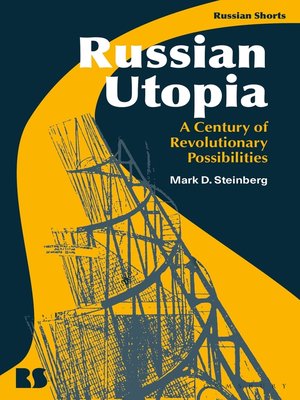Russian Utopia
ebook ∣ A Century of Revolutionary Possibilities · Russian Shorts
By Mark D. Steinberg

Sign up to save your library
With an OverDrive account, you can save your favorite libraries for at-a-glance information about availability. Find out more about OverDrive accounts.
Find this title in Libby, the library reading app by OverDrive.



Search for a digital library with this title
Title found at these libraries:
| Library Name | Distance |
|---|---|
| Loading... |
Winner of the 2022 Choice Outstanding Academic Titles
Mark D. Steinberg explores the work of individuals he recognizes as utopians during the most dramatic period in Russian and Soviet history. It has long been a cliché to argue that Russian revolutionary movements have been inspired by varieties of 'utopian dreaming' – claims which, although not wrong, are too often used uncritically. For the first time, Russian Utopian digs deeper and asks what utopians meant at the level of ideas, emotions, and lived experience.
Despite the fact that many would have resisted the 'utopian' label at the time because of its dismissive meanings, Steinberg's comprehensive approach sees him take in political leaders, intellectuals, writers, and artists (visual, material, and musical), as well as workers, peasants, soldiers, students and others. Ideologically, the figures discussed range from reactionaries to anarchists, nationalists (including non-Russians) to feminists, both religious believers and 'the militant godless'. This innovative text dissects the very notion of the Russian utopian and examines its significance in its various fascinating contexts.
Mark D. Steinberg explores the work of individuals he recognizes as utopians during the most dramatic period in Russian and Soviet history. It has long been a cliché to argue that Russian revolutionary movements have been inspired by varieties of 'utopian dreaming' – claims which, although not wrong, are too often used uncritically. For the first time, Russian Utopian digs deeper and asks what utopians meant at the level of ideas, emotions, and lived experience.
Despite the fact that many would have resisted the 'utopian' label at the time because of its dismissive meanings, Steinberg's comprehensive approach sees him take in political leaders, intellectuals, writers, and artists (visual, material, and musical), as well as workers, peasants, soldiers, students and others. Ideologically, the figures discussed range from reactionaries to anarchists, nationalists (including non-Russians) to feminists, both religious believers and 'the militant godless'. This innovative text dissects the very notion of the Russian utopian and examines its significance in its various fascinating contexts.







